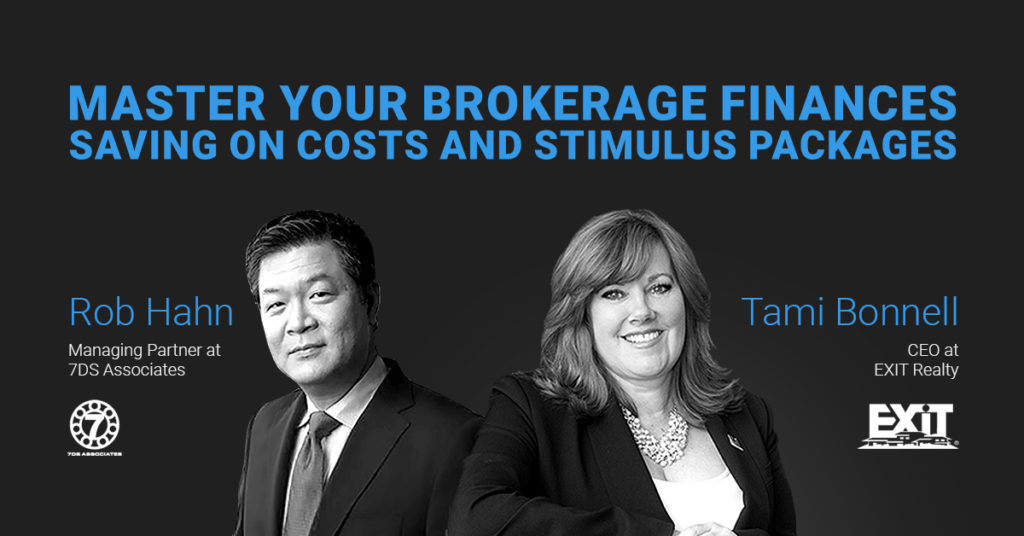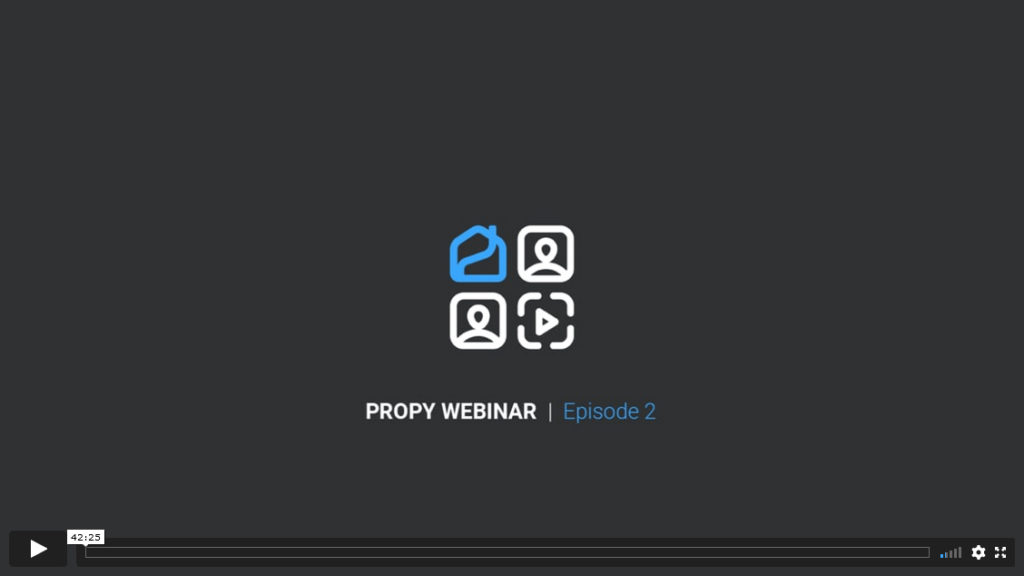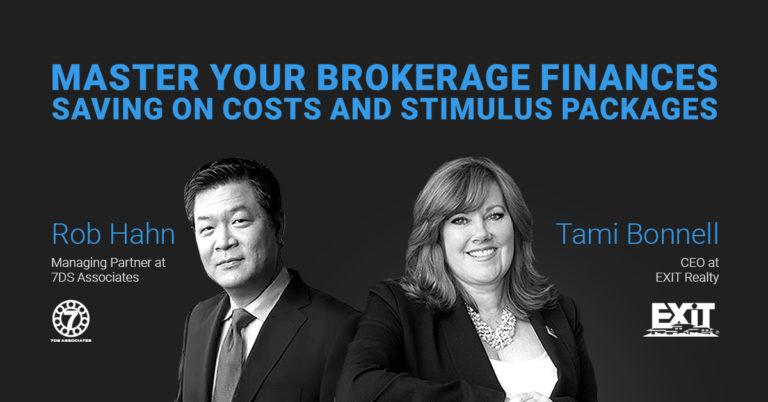Propy’s weekly webinar Episode #2 is with Rob Hahn, Managing Partner at 7DS Associates, and Tami Bonnell, CEO at EXIT Realty.

Rob Hahn, Managing Partner at 7DS Associates, and Tami Bonnell, CEO at EXIT Realty join Propy’s Alex Tieu, COO to discuss how to manage your brokerage finances during the pandemic. They also discuss some of the different loans and stimulus packages available to help business-owners survive during this unprecedented time.
The current big picture
As CEO of Exit Realty, Tami Bonnell is expected to be a good forecaster and to know where things are heading for the industry. As a result, Bonnell spends a lot of time talking with economists at the California Association of Realtors, as well as from the Wall Street Journal, and other financial publications. When she can find a common thread in what they all are saying, then she feels comfortable about where we are headed. The recession of 2008 was a perfect storm of several factors happening all at once, from mortgage-backed securities, the stock market, the real estate industry, and unemployment, that caused such a slow recovery. However, economists are viewing the COVID-19 pandemic as a one-time incident. Because mortgage rates have been great, the stock market has been doing really well, unemployment has been low, and real estate has been strong, they are predicting that we will come through this fairly quickly once we are able to flatten the curve. Bonnell stresses that that everyone needs to be reassured that this will not last forever.
Rob Hahn agrees with Bonnell, and shares another perspective that bodes well for a faster recovery: the equity in homes. He explains that during the 2007-08 recession period, people didn’t have much equity in their homes, and from the height of the bubble to when everything crashed, there was a 35% decline in home values. But today, it’s estimated that most home owners in the US have between 30-37% equity in their properties, so they will be able to weather any dip in the market that may occur. Overall, he feels the market will come back very strong.
The focus for brokers and agents in the immediate future
Hahn states that brokerages that are not well capitalized may end up in trouble from this once-in-a-lifetime situation. To survive when we can’t do business as normal, all depends on how much cash a brokerage or agent has in the bank to cover expenses while they aren’t earning commissions. He knows many brokers that can easily survive for 3-6 months, and he also knows some who only can survive for three weeks with their cash on hand. Hahn stresses that if you find yourself in that latter category, it’s critical that you think about how to increase your cash flow and reduce your overhead. You need to maintain as much cash as possible so you can survive during this crunch.
Bonnell explains that 79% of the brokerages in the country have 6 agents or less, and in most of those, the top producing agent is the broker/owner. Those brokers are already putting money back into their company, so she doesn’t expect to see as many of these brokerages closing down. What she does expect to see, however, are more mergers with these smaller brokerages. The pandemic has these brokers thinking about what is best for their future, and what will help them take care of their agents moving forward.
Bonnell recommends that every broker and agent immediately look at their profit and loss, and all of their variable costs. Even if you’re currently in good shape financially, she urges you to have a conversation with all of your creditors, and to look at where your money is going. Get smart about your finances, and your return on investment. Some of her suggestions included:
- Cell phone plans – can you change to reduce costs?
- Insurance policies – raise deductibles to lower premium payments
- Car payments – frequently you can add payments to the back end of the loan to get a reprieve from current payments
- Mortgages – look at refinancing at a lower rate
- What do you have on autopay? Do you need all those services?
Bonnell concludes by saying that mindset is four times as important as the activities you do, and feeling in control is important. When you go through all of your finances to lower your monthly overhead, and you’re reaching out to your clients and SOI with an empathy-oriented approach, you will feel more in control of your situation and your mindset will improve. It’s always easier to attract new business and new agents when your head space is in the right place.
SBA and EIDL Loans and other resources
Bonnell states that all agents should apply for the SBA loans, even if they are in great financial shape right now. SBA loans are available for all business owners, regardless of whether you are an independent contractor, and LLC, or an S-Corp. It’s even available for landlords. If you get a loan and end up not needing it, you can always pay it back early, so there is no harm in applying.
She explains that the Payroll Protection Program (PPE) has to be paid back in 2 years at 1% interest. You have to go through your lender to see if you qualify for the PPE loan, and you have to have your current taxes filed to complete this application. This loan is forgivable if 75% is spent on salary.
Hahn stresses that if you are a sole proprietor, you need to be aware that your net income is considered to be payroll.
The EIDL loan is available through the government, and the payments are deferred for the first 11 months. The $10k advance is completely forgivable.
Bonnell explains that the Cares Act is available to help if you can’t make your monthly mortgage payment. She is seeing Freddie Mac, Fannie Mae and FHFA all in lockstep to be as flexible as possible on transactions that are in process, by doing verbal employment verifications, handling appraisals, etc. This is providing stability, and there are many options available for people right now.
It’s important that the consumer be wary of scams surrounding some of these programs, Bonnell stresses. She urges people to remember that your bank, credit card company, or other creditor will never call you to ask for your social security number or account information. They will never call or email you to see if you want to refinance; it is your responsibility as a consumer to be proactive with your creditors if you need help.
Top tips for brokers today
Hahn said he recently had a chance to interview 16 large teams and they all had a consistent message. The very last thing a broker or team leader should do right now is reduce your staff. The reason is simple: When we come out of this, you will need to ramp back up quickly. If you’ve laid off staff, it’s going to take more time to gear up and grow your market share.
Bonnell agrees, and says the human element, along with their skillset is too valuable. If you lay off staff and then bring them back, they won’t trust you as much. To retrain new staff is time consuming. It’s better to cut hours a bit if you have to rather than lay people off.
As a final word of advice, Bonnell stresses that as broker or team leader, you need to connect and communicate with your people as often as possible. Use Zoom calls so you can see how people are reacting, whether they are disconnected or freaking out. By remaining visible and connected, you will build loyalty with your team.







